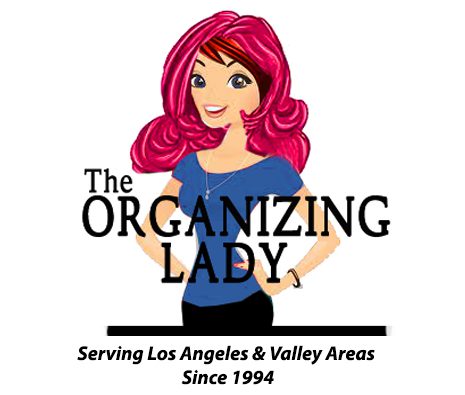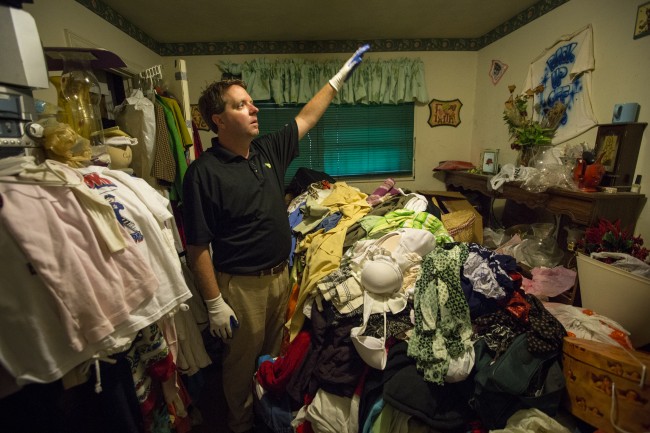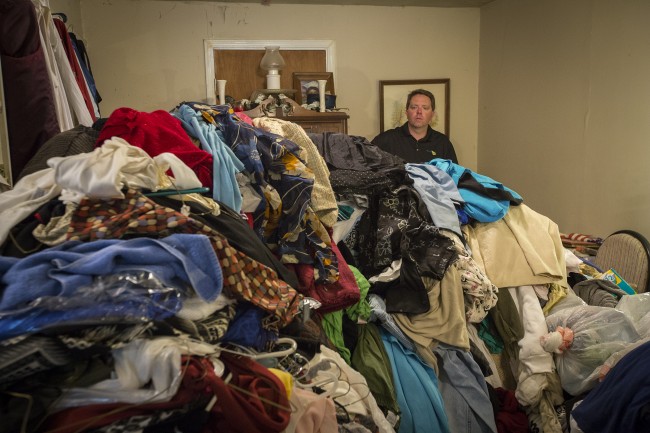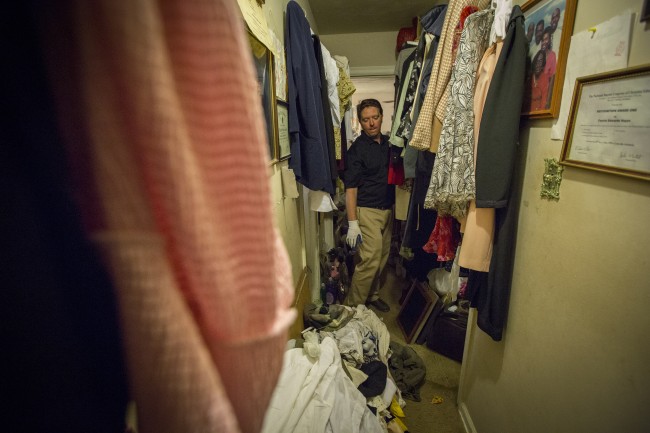Matt Paxton: Extreme clutter expert, star of Hoarders: Family Secrets, author “The Secret Lives of Hoarders”
As I entered the lobby of the Hilton Universal City, I had a purpose – to meet the man who has been instrumental in changing the lives of so many people. And not just ordinary people, but people with a desolating and life-altering problem: hoarding.
To be fully prepared, I knew my first stop should be the Starbucks stand inside the hotel. I wasn’t standing there more than a few seconds when I saw a cheery-looking fellow approach the stand. I instantly recognized him – it was Matt Paxton. And he was the man I was there to talk to.
The fact that he also arrived at the Starbucks stand before our meeting immediately told me that he was a man who enjoyed good taste, so there was sort of a like-minded-coffee-people bonding that took place as we shook hands.
Matt handed me his book, “The Secret Lives of Hoarders”, a gift I graciously accepted and eager to read. From what I knew of its contents, I was going to hear some juicy behind the scene stories of his interludes with some of the most ghastly hoarding cases in the country.
With drinks at hand, we headed into the elevator and the conversation began to flow before we got into the room and I could set up my recorder and video camera. That’s okay, I told myself, because I was going to take everything in, recorded or not.
Good thing is, I already knew a lot about Matt. I knew he stars in Lifetime’s show “Hoarders: Family Secrets”. I knew he also had starred in the show’s precursor, “Hoarders” when it was on the A&E network. I knew he had a business called Clutter Cleaner where he and his diligent crew of extreme clutter busters have engaged in the lives of over three hundred hoarders nationwide. And I knew that he wrote a book that’s now on the NY best sellers list, that he has a popular podcast show, and that he speaks to numerous attendances about the issues of hoarding and senior relocation.
What I wanted to know more about was the man himself. And that’s exactly what I got.
So, with my video camera in one hand and my ears (and eyes) peeled to his every word (instead of the camera, sorry about that), we began the interview while he tried to finish packing his suitcase for his next rendezvous.
Matt talks about hoarders
It isn’t just experience that has given Matt insight into the lives of hoarders. It’s from really getting to know them, and the way he’s achieved that is by talking to them.
For a hoarder, he says, “You’re not allowing family members into your life. You’re loosing part of your actuality, your life, because you are hiding your disorder.”
Matt took notice that the families of a hoarder are typically angry and antagonistic toward them. “They’ve lived with it for 20 years, 30 years. They’ve seen their family money disappear, they’ve seen assets disappear, they’ve seen their loved ones, their sister that they love or their brother that they love, they see him disappear.”
“Hoarding is not who the person is. It’s what they’re dealing with right now, in this pocket of time. Two years from now, hopefully they can start to go back to who they wanna be.”
“When we look at a hoarder right now, especially a hoarder on TV, they may not look that great. But that’s just who they are right now. Ten years ago they were an awesome and really cool lady or a man that had a fascinating job.”
“And they had a husband or a boyfriend or a girlfriend. They were somebody that had a great life, and then some bad stuff happened to them and hoarding kicks in.”
“I try to tell everybody hoarders are not bad people, they’re good people that have had bad things happen and I don’t think family members understood that.”
“Hoarding is just a really shitty truck stop. It’s not who you are for the rest of your life.”
When talking about therapy, Matt recounts how one woman living in filth had turned her life around.
“One lady had 18,000 pounds of poop in her house. She’s getting married. She got her life back together. It’s awesome. She got her therapy, she got regulated on meds, she got good meals every week.”
“All of a sudden some of the social issues that she dealt with that caused the hoarding started to get handled in therapy. But when she was living at home literally in 18,000 pounds of poop, how can you focus on therapy?”
“That’s the stories I want to get out.”
Matt talks about the show Hoarders
“I’m very aware that we’re putting a mental disorder on television for entertainment,” says Matt. And while that is the case, he also made it very clear that he only does it if therapy is part of the arrangement.
To Matt, therapy is the most important part of the process in helping a hoarder get their life straightened out. Without that, he believes his help is just a temporary fix and that there is little hope that anything will change for them in the long run.
“For me they gotta be willing to go to therapy, and they gotta be willing to have their family involved. That’s my only criteria. I call it the three F’s – family, faith and friends. Without that in place, the chances of the house staying clean, not very good.”
“When we started the season, it was either an organizer or a therapist. You didn’t get both, but my issue was that they agreed to pay for therapy for the person after I left. So that was the kicker for me. As long as they paid for therapy, I was willing to do it.”
But aside from the therapy, Matt’s personal success with hoarders on the show begins on a different level.
“It was a lot of do what I say, not what I do. Yeah, a lot of it’s luck, to be honest. And I will tell you the reason I did well on the TV show is I just speak what I think. I talk to the hoarder as an equal.
“I treat them as you’ve seen me on TV. I’ve spent a week with that family already. So when I’m getting angry at a hoarder and I’m saying, ‘Come on man we’ve got this.’ I’m saying that to a friend. And I’m speaking to him like I would speak to grandma or my mom or whoever else I’m working with.”
“I definitely get accused of being too blunt or too prude but that’s all I know. I talk to them as an equal. And I expect them to do more because they’re my friend and they’re good people. I know the good person that they are so when I’m pushing them, I’m pushing because nobody else will.”
“And they know from my constant interaction with them that I care about them. They know how I talk to them. I knock on the door. And then I take three steps back and I invite them outside. I don’t go in the house, trying to get into their stuff.”
“I get to know them outside away from the mess because the mess isn’t who they are. So I spend as much time as I can, just being with them, just being, not talking about hoarding. I find out what their favorite sports are, what’s their favorite food. Like, who are they as a person? Not the mess – the mess is just what’s going on now.”
“I can’t ask them to get rid of something if I don’t even know what kind of person they are, or what interests them. Like what do they care about? What do they love? What gets them excited? Do they have kids? Do they have friends, a partner, whatever? Why are they doing this? If it’s just because the county’s going to throw them away, we maybe don’t want to do this.”
“I don’t care what they have, but I want to know what their real motivation is because then, if we know that, then I can get them to the finish line. And the finish line is a clean house.”
The popularity of the show “Hoarders” began on A&E network and later moved to the Lifetime channel as “Hoarders: Family Secrets” this year where the network gave the thumbs up to show the real thing and just help people.
“We know probably 80% of the people watch because it makes them feel better about their own lives, just like I watch Biggest Loser. I’ll be watching Biggest Loser and eating popcorn, ‘Hey I’m not so bad, I’m fine. Right?”
“But there’s 20% of the population that watch our show and they get actual tips on how to help their loved ones or they get hope.”
“They find hope that their life can get better. I’m willing to do the show as long as we give therapy to help that 20%.”
Every show starts off with some initial research on the hoarder and in preparing the team.
“You never know what you’re gonna find. So we send the scout out. We get all set up for safety gear. We train all of our guys.”
“From ServiceMaster Restore all the way down to organizers, we give a class the day before we start cleaning to make sure they understand how to communicate properly.”
“I probably spend 20 hours with the family before in preparing for safety before I even walk in the front door. And I’ll spend a day before the cameras roll. I’ll spend about three or four hours just hanging out the house getting to know them.”
“I don’t think many people have spent more time in hoarded homes more than me and my three guys that started my business Clutter Cleaner and the camera crew. I mean they’re in there for five days, ten hours a day, working side by side with hoarders. The hoarder is there the whole time. We don’t film anything unless they’re there.”
“We really get to know them. That’s why you see a lot of things change by the third or fourth day of cleaning. Because that hoarder learned to trust us. And you can’t get trust in the first ten minutes.”
It seems that Hoarders is the last few reality shows that are truly “real” and without scripted or encouraged drama.
“You don’t need to encourage drama with Hoarders. It’s gonna happen. It took us a while to get the camera crews to understand, ‘Dude, just keep the camera’s running. It’ll be good on its own.”
Although each episode is an emotional one for Matt, the rewards outweigh the difficulties. “I’m not here to be famous and make a TV show, I’m here to make sure this person has a better life.”
Matt talks about his company and affiliations
Matt’s company “Clutter Cleaner” had its beginnings in 2006 when he helped his grandmother move from a house she had lived in and accumulated things for 20 years.
“I get paid to help people which is awesome.”
“But my ideal is, it’s not right for us to take the job if the person is not able to do some type of interview. So I find out. If we know they’re unwilling to do therapy, we don’t take the job. Because you’re just setting them up for failure. ”
“My system with ServiceMaster Restore is we go in and we clean the whole house in like three, four, five days. For a hoarder that needs one hour a day for nine months, we’re not gonna be the solution. We call in a professional organizer.”
“Whether you use a cleaning company like me and ServiceMaster Restore or you use a professional organizer like Dorothy Breininger, you still gotta have a therapy in place on the back end, and that’s really the kick.”
Matt talks about his future goals
“I got the best gig in the world man. I have made a good living off of helping hoarders. So I do feel an obligation to figure out this affordability issue. We’ve helped with awareness and now it’s time to bring affordability.”
“We’re the ugliest of the disorders out there. We’re starting to understand hoarding, but no one’s giving money for it. So right now it’s on families. There are some government that will throw a little aid here, a little aid there.”
“I see the miracles three, four, five years down the road. I’ve got all these hoarding weddings this summer, where all these people eight years later got their life back together and they’re getting married. So I know when I’m looking at this lady and I’ve got to sort through her eight foot of diapers, well that’s just getting me closer to that miracle.”
“I hope to build a very big foundation. I do hope that. I want to build a big national solution that gives everybody awareness and education, and can help me make this cleanup affordable. When that’s done I can retire.”
Watch interview:



